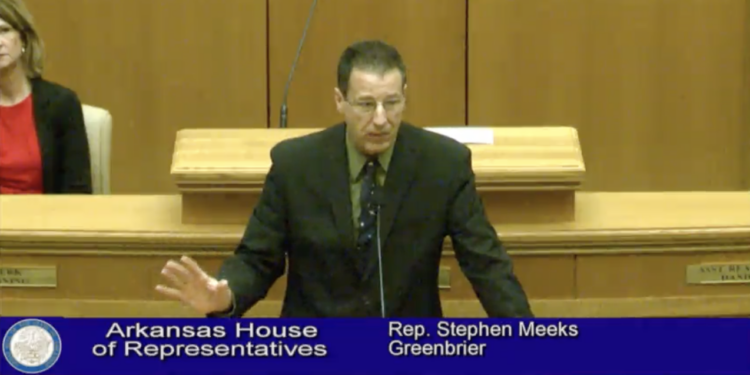[ad_1]
Two proposed laws to regulate cryptocurrency mining operations in Arkansas will head to the governor’s desk after passing the House Wednesday with little debate or opposition.
Senate Bill 78 would place noise limits on crypto mines, prohibit them from being owned by certain foreign entities and allow local governments to pass ordinances regulating the mines. Senate Bill 79 would require crypto mines to be licensed by the state Oil and Gas Commission under the Department of Energy and Environment.
The bills were among the few non-budgetary pieces of legislation taken up during the fiscal session, along with a plan to increase all state employees’ pay by up to 3%, which is also headed to Gov. Sarah Huckabee Sanders’ desk.
Cryptocurrency regulations became a priority for lawmakers after Act 851 of 2023, or the Arkansas Data Centers Act, was introduced and passed in the final week of the 2023 legislative session. The law limited local governments’ ability to regulate crypto mines, which are large groups of computers that harvest digital currency and are often located in rural areas because of the space they take up.
Six of eight crypto mining resolutions fall short in Arkansas House
“What we have here … is an emerging industry,” said Rep. Jeremiah Moore, R-Clarendon, the House sponsor of SB79. “We’ve never seen anything quite like this in our state before.”
There are crypto mines in DeWitt, which is in Moore’s district, and in the Bono community near Greenbrier. An out-of-state entity has attempted to start a crypto mine near Harrison.
Sen. Bryan King of Green Forest and Rep. Ron McNair of Alpena, both Republicans who represent Harrison, voted for SB79 and against SB78. King sponsored six resolutions to introduce his own crypto mining legislation, but none received the required two-thirds approval from lawmakers in each chamber.
Rep. Stephen Meeks, R-Greenbrier, has repeatedly expressed support for crypto regulations on behalf of the Bono community, where residents have filed a lawsuit claiming noise pollution from the local crypto mine.
Meeks said he and local Faulkner County officials have approached the people behind the mine and asked them to reduce its volume.
“They put a soundproofing wall up on one side, but all that did was send the sound down to somebody else,” Meeks said. “They weren’t willing to do what was necessary to be good neighbors, and quite frankly, I believe it’s because they simply just didn’t care.”
Both bills would give “a prohibited foreign-party-controlled business” exactly one year after the enactment of the policies to divest from ownership of an Arkansas crypto mine. Sen. Joshua Bryant, R-Rogers, is a sponsor of both bills and said Tuesday that the language was in both bills in case one did not become law.
Each bill passed the House with 93 votes for it. Reps. Andrew Collins, D-Little Rock, and Justin Gonzales, R-Okolona, were the only members to vote against both bills.
Collins said the language pertaining to foreign ownership concerned him Tuesday before he voted against the bills in the House City, County and Local Affairs Committee.

The bills would prohibit ownership of crypto mines by the list of foreign countries from which the federal International Traffic in Arms Regulations bans imports, exports, sales or a combination of the three. Collins argued that the bills would place unfair and possibly unconstitutional restrictions on citizens of those countries who live in the United States or Americans who live in those countries.
Meanwhile, Gonzales said in an interview Wednesday that he did not have a problem with the foreign ownership language but also believed Act 851 did not need to be amended.
Gonzales said he thought the bills would allow local governments “to discriminate against a business just because of what it is.” Bryant has said the legislation is supposed to prevent this from happening.
Several lawmakers, including Gonzales and Bryant, have said there will likely be more crypto mining legislation proposed in the 2025 legislative session.
[ad_2]
Source link

